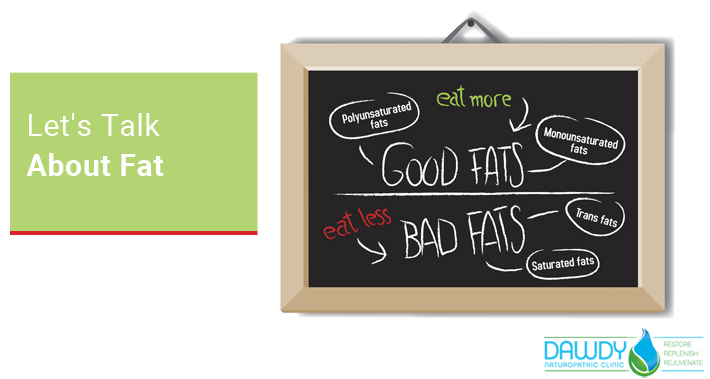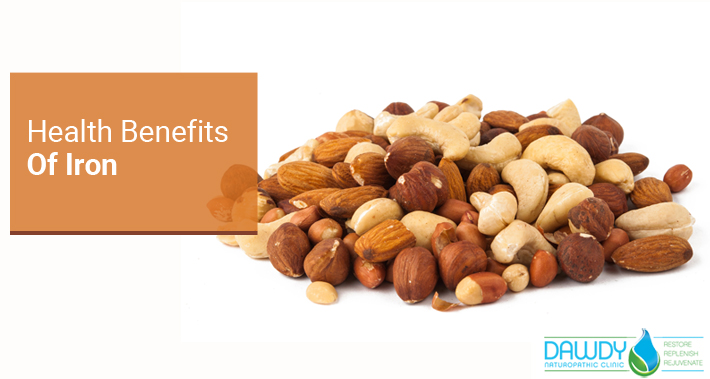Let’s Talk About Fat
Fat.
The way some people talk about it, you’d think it was as offensive as many people find the other “F word”.
For years it was demonized, thought of as something bad, something to be avoided at all costs.
However, many of the “fat free” products which lined grocery store shelves in the eighties and nineties were full of sugar, refined carbohydrates and other unhealthy ingredients.
We’ve learned since then that not all fat is bad, and our bodies actually require it to function properly.
As a women’s health naturopathic doctor I want to help you understand the differences between the types of fat you will encounter, which ones you need – and which ones you actually should avoid.
Keep reading to get the skinny – on fat.
What Is Fat?
Fat is one of the three main macronutrients, along with carbohydrates and protein.
It has a number of important roles in your body, which include:
- Promoting absorption of vitamin A, vitamin D, vitamin E, and vitamin K
- Providing your body with energy
- Cell creation
- Producing and balancing your hormones
- Providing protection for your organs
- Keeping you warm
Is Fat Bad For You?
So obviously fat is important, but it doesn’t mean you can just eat any fat and expect to get the above benefits.
Some fats are better for you than others, so it’s important to know the differences.
Today we’re going to take a closer look at a few of the different types of fat you might come across, and what each one means for your health.
1. Trans Fats
Trans fats have been getting a lot of attention over the past few years.
Artificial trans fats have been banned by Health Canada, and a similar move was undertaken by the Food and Drug Administration in the United States.
These bans come for a good reason – a 2007 study in the journal Circulation found a correlation between trans fat levels in the blood and increased risk of chronic heart disease.
In addition, a study in the European Journal of Clinical Nutrition found trans fatty acids caused LDL [bad] cholesterol to go up, but did not also increase HDL [good] cholesterol.
This is notable because most types of fats cause an increase in both types of cholesterol.
As a result, a great step in a naturopathic treatment plan for heart disease prevention is to reduce – or even eliminate – the presence of trans fats in your diet.
Dietary Sources
Although artificial trans fats have been banned, some foods may still contain them naturally.
A few to watch out for include:
- Margarine
- Nondairy coffee creamer
- Vegetable shortening
- Baked goods
- Frozen pizza
- Processed snack foods
- Fried foods
- Some vegetable oils
- Microwave popcorn
Just because something is on the above list doesn’t automatically mean it contains trans fats, however – these are just foods where it’s likely to appear.
It’s important to read the labels on your food, however, as many manufacturers are coming out with versions of these foods which are free of trans fats but might be higher in sugar than other similar foods.
2. Saturated Fats
Saturated fats are fats which come from animal products and can be found in dairy products and high fat meat.
They have been linked to higher cholesterol levels and are generally associated with higher levels of LDL or “bad” cholesterol.
High levels of LDL cholesterol can result in blockages in the arteries and increase your risk of developing heart disease.
Dietary Sources
Some foods which contain saturated fats include:
- Eggs
- Butter
- Palm oil
- Coconut oil
- Red meat, including pork, lamb, and beef
- Cheese, ice cream, and other dairy made from whole milk
- Poultry skin (chicken, turkey, etc)
Avoiding saturated fats entirely is difficult for most people.
However, it’s a good idea to avoid it as much as possible.
3. Monounsaturated Fats
You have probably heard reference to needing “good fats” in your diet.
Monosaturated fats are an example of these “good fats”.
Adding monosaturated fats to your diet can help improve blood cholesterol levels and help to lower the risk of developing heart disease.
Dietary Sources
Monounsaturated fats can be found in foods such as:
- Nuts, including almonds, pecans, and hazelnuts
- Avocado
- Olive oil
- Peanuts and peanut products
4. Polyunsaturated Fats
Polyunsaturated fats are the other main type of “good fats”.
These include omega-3 and omega-6 fatty acids.
Omega-3 fatty acids act as one of the key building blocks of cells, and provide energy to support your immune system and cardiovascular system along with many other benefits, including:
- Helping with brain development in children
- May help manage depression and <a href=”https://dawdynaturopathicclinic.com/natural-supplements-for-anxiety/”>anxiety</a>
- Keeping menstrual pain under control
- Keeping your skin healthy
- Keeping your bones healthy
Dietary Sources
Polyunsaturated fats can be found in:
- Tuna, salmon, and other fatty fish
- Flaxseeds and flaxseed oil
- Walnuts
- Corn oil
- Sunflower oil
Book Your Appointment With Dawdy Naturopathic Today
Do you find issues related to food and diet confusing?
Aren’t sure what the best approach is to meet your health goals?
There are so many different food plans and diets on the market these days, it can certainly be overwhelming.
Whether you’re trying to lose (or gain) weight, or dealing with an issue such as food sensitivities, hormonal imbalances, or just generally trying to live healthier, I’m Dr. Kimberly Dawdy, naturopathic doctor in Ottawa, and I can help.
Rather than a “one size fits all” approach, I’ll create a treatment plan tailored specifically to your individual needs and goals.
Book an appointment with me today to get started.
Yours in Health,
Dr. Kimberly Dawdy, ND
Dawdy Naturopathic Clinic
6899 Sunset Blvd,
Greely, ON K4P 1C5
-https://g.page/dawdynaturopathicclinic
Dawdy Naturopathic Clinic offers a variety of naturopathic health solutions for individuals and families in Ottawa and the surrounding area.





